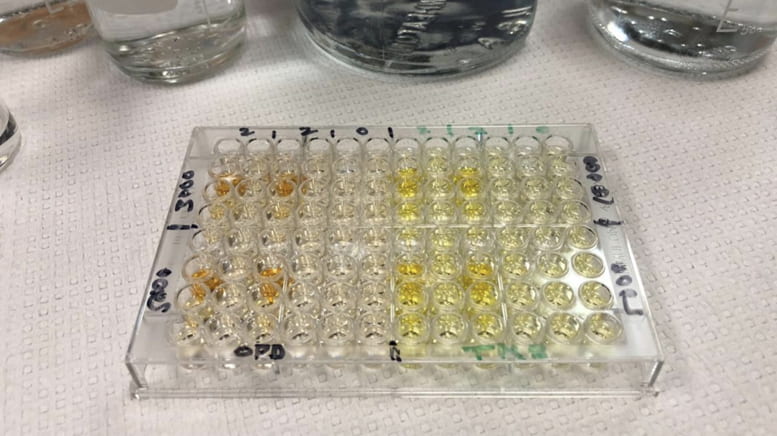Study is the first to measure neutralizing antibodies in a large community-based sample: More people exposed to COVID-19 virus than previously known
April 20, 2021

An interdisciplinary research team led by anthropology Professor Thomas McDade of Northwestern University launched a sizeable community-based study in June 2020 called SCAN: Screening for Coronavirus Antibodies in Neighborhoods. The research team included experts in community-based surveys, population and public health, medicine, and laboratory science.
SCAN seeks to trace the spread of SARS-CoV-2, the virus which causes COVID-19 and to pinpoint the behaviors and circumstances associated with exposure and severity of infection.
The study revealed many important insights, including nearly 1 in 5 adults in the Chicagoland area have been infected with SARS-CoV-2 and that 40% of these infections were asymptomatic.
“Our study is the first to measure neutralizing antibodies in a large community-based sample. The findings are telling us a lot about the level of immune protection in the general population, which has implications for vaccination strategy and progress toward herd immunity,” explained McDade who is also Director of IPR’s Cells to Society: The Center on Social Disparities and Health.
McDade said that interest in the study was tremendous, with more people wanting to participate than they needed to enroll. Since June 2020, SCAN has enrolled nearly 10,000 people in the Chicago area.
“It seems clear that people are very interested in learning about whether they might have been exposed to SARS-CoV-2, and the information they are sharing with us is leading to important insights regarding the contexts and behaviors that lead to infection, and the level of immune protection that follows from infection,” said McDade.
By screening the community for antibodies, researchers were able to understand the proportion of Coronavirus cases that could otherwise go undetected by people who were asymptomatic. Researchers also wanted to identify contributing behavioral and social factors that affected viral transmission.
“Our aim is to screen people in the community for antibodies to determine if they have been exposed to SARS-CoV-2. This is particularly important given how many people have mild or asymptomatic cases. We can then investigate the individual-, household-, and community-level factors that predict viral transmission,” said McDade.
The SCAN study employs a novel no-contact research platform that integrates survey and laboratory methods. This approach allowed researchers to reach participants from a large and diverse group.
In the study, participants completed a web-based survey that included questions about their symptoms of infection, healthcare access, COVID-19 testing and diagnoses, and behavioral responses to the pandemic. Participants also returned a self-collected finger stick dried blood spot (DBS) sample in the mail to the research team.
McDade and his research team realized that the antibody tests that were available early in the pandemic were likely to give erroneous results. With that in mind, they developed a new, finger stick “binding antibody test” to detect prior exposure to SARS-CoV-2 with great accuracy.
“Our test is very accurate—as accurate as the gold standard protocols that use serum from venipuncture. The problem with serum tests is that they require venous blood, which is particularly difficult to collect when people are told to stay home and the health care system is overwhelmed,” explained McDade. “Our approach combines the convenience and safety of at-home blood collection with the quantitative rigor that is possible in the lab,” he said.
SCAN researchers also developed a second antibody test that tests for neutralizing antibodies. Unlike the binding antibody test, their neutralizing antibody test also reveals the level of immune protection an individual may have against SARS-CoV-2 infection.
McDade explains, “The neutralizing antibody test measures the extent to which antibodies in a sample can inhibit—or neutralize—the interaction between the virus and the ACE2 receptor. The virus has to bind this receptor to initiate an infection, and antibodies can block that interaction to prevent infection.”
The antibody tests McDade’s research team developed are now used beyond Chicagoland, in nationwide and global SARS-CoV-2 research.
“The finger stick antibody test we developed has been used in a study of healthcare workers in Nigeria, as well as a national sample of college students in the US,” said McDade.
More about SCAN can be found in the Institute for Policy Research (IPR) Report written by McDade and his colleagues. Important findings include:
- The majority of SARS-CoV-2 infections in the community are mild and asymptomatic, and they generate lower levels of protective immunity than has been reported in clinical studies which focus on more severe cases of COVID-19.
- Rates of infection were seven times higher in Chicago—as indicated by a positive antibody test—than were detected by viral testing for acute infection.
- Chicagoans in more disadvantaged neighborhoods had more severe COVID-19 cases compared to adjoining neighborhoods, but antibody testing revealed no significant differences in the likelihood of exposure to the virus between the areas.
- Those exposed to COVID-19 in the home scored 2.5 times higher on a measure of symptom severity. They also had higher levels of antibodies than individuals who picked up the virus outside of the home.
- In both people who had mild or asymptomatic cases, as detected by the at-home blood test, and the people never exposed to the virus, two vaccine doses were required to reach the high levels of antibody that likely indicate full immunity.
Below, McDade explains the SCAN findings on NBC 5 News.
Science & Technology

Northwestern accelerates quantum research with NVIDIA technology
September 19, 2025
NVIDIA code could help researchers tackle computationally demanding tasks hindering quantum research Northwestern University physicists are using NVIDIA technology to tackle the computationally demanding tasks hindering quantum research. Northwestern theoretical physicist Jens Koch and his research group…

CRISPR’s efficiency triples with DNA-wrapped nanoparticles
September 18, 2025
New system delivers CRISPR machinery more safely and effectively into cells With the power to rewrite the genetic code underlying countless diseases, CRISPR holds immense promise to revolutionize medicine. But until scientists can deliver its…

Passion for the planet: A new generation of environmental stewards starts here
May 29, 2025
Over the last two decades, the Weinberg College-housed Program in Environmental Policy and Culture (EPC) at Northwestern has embraced the humanities and social sciences and cultivated a new generation of environmental stewards. Growing up in…

Northwestern receives $25 million gift to advance adolescent mental health research
May 16, 2025
New institute will study psychology of emerging adults, leading to innovative wellness programming for students at the University and beyond Northwestern University is launching the Institute for Adolescent Mental Health and Well-Being, an interdisciplinary initiative…




